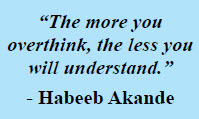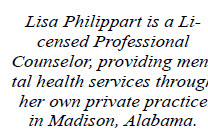 By: Lisa Philippart
By: Lisa Philippart
In my last article, we began to look at ways to stop the pattern of overthinking. The key is to realize that overthinking is a habit, and that you will need to experiment with a variety of approaches to figure out what works best for you. How we habitually think determines how we habitually feel. So, the basic problem with overthinking is often a response to feeling bad emotionally. But when your thinking is riddled with cognitive distortions, you end up feeling worse. Cognitive distortions are errors in thinking that lead to excessive emotional reactions. For example, “She probably thought I was a complete idiot.” Can you read people’s minds? “Why am I such an idiot?” Labeling yourself as an idiot because you made a mistake is a BIT of an overgeneralization. And while little bits of negative self-talk like this might seem minimal, they are anything but. An effective way to break the cycle of overthinking is to get good at spotting these distortions in your self-talk. When you can point out that your thinking is not entirely accurate, you will be more likely to neutralize your thinking patterns.
Mindfulness is a word thrown around a lot lately. The key idea behind mindfulness is that you can train yourself to be aware of things without thinking about them. Mindfulness teaches you to be able to notice when thinking happens and to shift your attention out of overthinking mode and into awareness mode. There is a simple version of mindfulness called ordinary mindfulness that involves paying attention to the experience of an activity during daily life rather than thinking about it. For example, when you are out for a walk, instead of thinking about a big fight you got into earlier, you could practice keeping your attention on the beautiful fall colors of the trees. You are not thinking about the trees, you are just noticing them.
 Another idea to block the overthinking pattern is to experiment with micro-decisiveness. A lot of people struggle with making decisions and being indecisive is a symptom of overthinking. Being decisive will help you stop overthinking. The problem is how do we become more decisive? I think the biggest mistake people make in terms of being more decisive is starting with decisions that are too big. You have to work up gradually, which is where micro-decisiveness comes in. Practice being decisive in very small, low-stakes decisions. Then slowly work your way up to slightly harder decisions, building confidence along the way.
Another idea to block the overthinking pattern is to experiment with micro-decisiveness. A lot of people struggle with making decisions and being indecisive is a symptom of overthinking. Being decisive will help you stop overthinking. The problem is how do we become more decisive? I think the biggest mistake people make in terms of being more decisive is starting with decisions that are too big. You have to work up gradually, which is where micro-decisiveness comes in. Practice being decisive in very small, low-stakes decisions. Then slowly work your way up to slightly harder decisions, building confidence along the way.
Worry is one of the most common forms of overthinking. A big reason it is so hard to stop worrying is because worry is one of our brain’s most effective ways to get you to remember things. If you’ve got things on your mind that your brain thinks are important, your thoughts are going to get thrown at you repeatedly, so you don’t forget them. You can stop your mind from throwing so many worries at you by convincing your mind that you remember the worries, and have a place to put them. This requires a little exercise called scheduled worry. Find a time in the evening to sit down with a pen and paper (not your phone!) quietly. Set your phone timer for ten minutes. Write down every worry you can think of. Keep in mind you are not solving your worries; you are just listing them. After 10 minutes, stop, put the paper away until tomorrow, and get on with your evening. You can’t simply make yourself stop worrying, but you can train your mind to do it at the right time.
 On a very basic level, overthinking is a form of avoidance. The problem with avoidance is that while it can lead to temporary relief, you never actually move forward on anything. At some point you have to be willing to stop running away from what you don’t want, take a stand, and start moving toward the things you do want. But what if you don’t know what you want? This is where values come in to play. Our values, the things we really want and that matter most to us in life, have incredible motivating potential. Our values pull us toward our goals. But values are only motivating if they are clear. So ask yourself, “If I were free from overthinking, what would I really want to do most with that time and energy?”
On a very basic level, overthinking is a form of avoidance. The problem with avoidance is that while it can lead to temporary relief, you never actually move forward on anything. At some point you have to be willing to stop running away from what you don’t want, take a stand, and start moving toward the things you do want. But what if you don’t know what you want? This is where values come in to play. Our values, the things we really want and that matter most to us in life, have incredible motivating potential. Our values pull us toward our goals. But values are only motivating if they are clear. So ask yourself, “If I were free from overthinking, what would I really want to do most with that time and energy?”
If you want to stop overthinking so much, the key is to understand why you do it and then implement targeted strategies to eliminate it.
By: Lisa Philippart
Licensed Professional Counselor










 July 19, 2024
July 19, 2024




